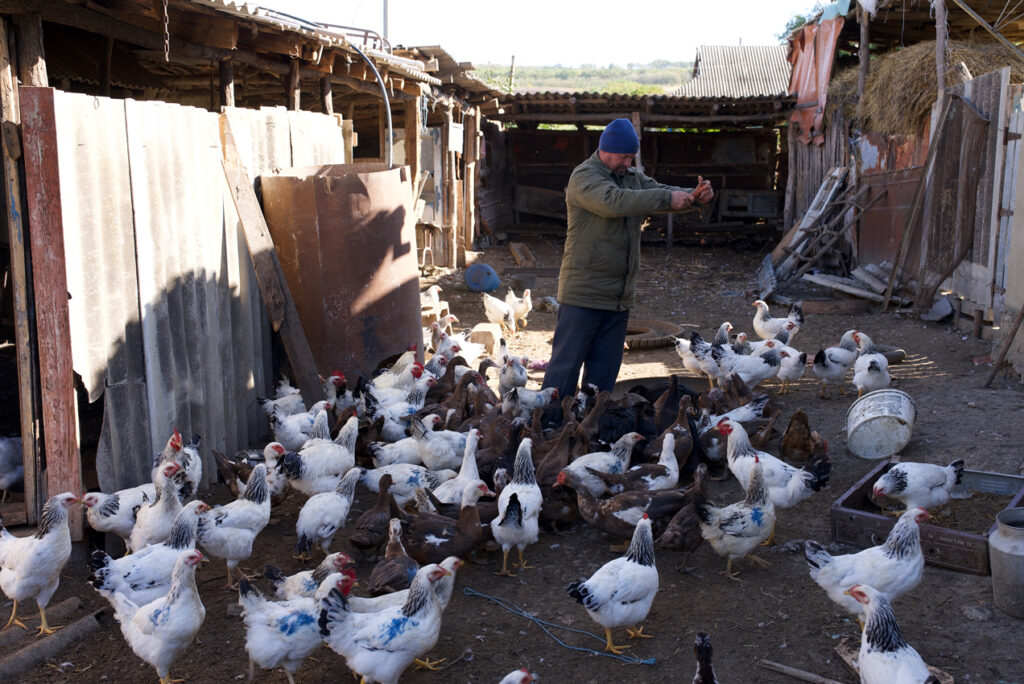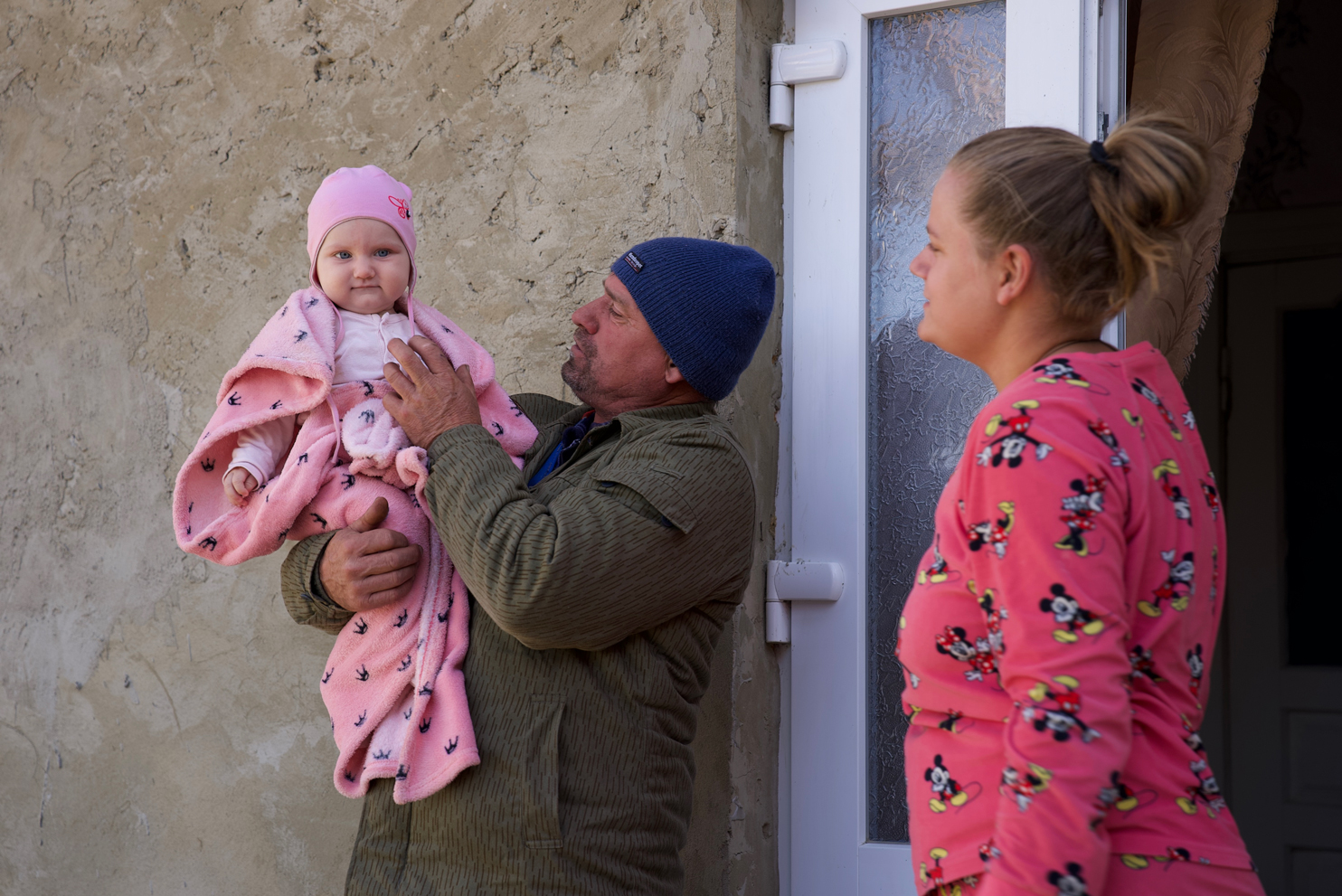
© UN Moldova
In the Republic of Moldova, where fodder provisions help families use their income to meet other basic needs, support for animals means support for Moldovan families.
In 2022, Moldova faced an extreme drought that led to 50- 60 per cent losses in some of their major agricultural products like sunflower, corn and wheat. With this loss of income and increased input prices, families with animals couldn’t buy the necessary animal feed. According to the estimates of the Government of the Republic of Moldova, 70 per cent of the country’s small farms were already suffering from a lack of resources, inputs and arid weather conditions, and the war in Ukraine further impacted the prices of agricultural inputs, most of which the Republic of Moldova imports from Russian and Ukraine. Fertilizers, fuel and seeds became three to five times more expensive than in 2021.
Throughout 2023, the cost of imported agricultural inputs remained very high, resulting in high production costs. At the same time, prices of agricultural goods dropped dramatically throughout the year. This has resulted in a 30 per cent decrease in revenue for rural families compared to the last five-year average.
“May our cattle be healthy! Otherwise, how are we going to manage?” Mihail exclaims.
Spouses Mihail and Vera Gradinaru were born and grew up in Cirpesti, a village situated about 120 kilometres away from the capital of the Republic of Moldova, Chisinau. Set amidst land for cultivating and pastures for grazing, this village of just about 600 households is one where families predominantly rely on farming or raising cattle.
After knowing each other for many years, Mihail and Vera got married and now have five children. Both parents work in the village, Vera as a kindergarten teacher’s assistant and Mihail as a farmer. Cows, pigs, goats, sheep, rabbits and poultry fill up the backyard of their house.

The Gradinarus’ youngest daughter, Livia, still lives with them, as does their daughter, Alina, who just recently had a baby, and whose husband is temporarily working abroad.
It is a full house, but both Vera and Mihail are used to this, having grown up with many siblings themselves. And the spouses are determined to give their children schooling and the option of obtaining the type of job they want to do. “We couldn’t afford studies. I come from a family with eleven children, while my wife was one of four. We had to start working from a young age. Nobody really asked us what we wanted to do in life. That’s why we try to help our children as much as we can, so that at least they have a profession and can get by easier, either in the village or wherever their destiny takes them,” describes Mihail. Mihail on the other hand continues the work that his parents did and is content keeping livestock. “We have always had animals, this is what our parents did, this is what we do,” explains Mihail. He and Vera are particularly tied to their two cows: Marta and Stella. As the spouses say, these cows are the family’s greatest support. They are vital for their family’s nutrition, and the milk also serves as payment for helpers who work on their farm or house.
In 2022, when the country faced an extreme drought, the Food and Agriculture Organization of the United Nations (FAO) distributed cattle fodder to 2,638 families across five districts in 2023. Each family received between 350 and 375 kg of fodder, which was vital in addressing existing feed shortages. The activity was part of a project implemented jointly with the United Nations Development Programme and financed by the Austrian Development Agency — the operational unit of Austrian Development Cooperation — and the Government of Switzerland.
According to the estimates of the Government of the Republic of Moldova, 70 per cent of the country’s small farms were already suffering from a lack of resources, inputs and arid weather conditions, and the war in Ukraine further impacted the prices of agricultural inputs, most of which the Republic of Moldova imports from Russian and Ukraine. Fertilizers, fuel and seeds became three to five times more expensive than in 2021.
Throughout 2023, the cost of imported agricultural inputs remained very high, resulting in high production costs. At the same time, prices of agricultural goods dropped dramatically throughout the year. This has resulted in a 30 per cent decrease in revenue for rural families compared to the last five-year average.
Life’s challenges
Amidst these challenges, Mihail also had to undergo several spinal surgeries. Although he is full of energy and enthusiasm, his mobility is reduced, and he can no longer do all the physical labour he once did.
“Before the surgeries I also used to work in the forest, providing my family with wood. Now I am content only with what I can do around the house and with the cattle in the pasture.”

The FAO support for their animals was a huge assistance for the family. “Animals, like children, have their own expense… And when you can hardly provide bread for your children, it’s obviously even harder to buy animal feed,” describes Vera.
With the fodder donation, Mihail and Vera can use some of the money saved to take care of other vital expenses. For some time, the family had been struggling to repair the leaky roof of the old house in which they lived. They used the extra cash they saved on fodder to pay for construction materials and repay some of the debts they had due to the house repairs.
“It’s the first time we get animal feed. You know, it helps a lot,” adds Vera.
In early 2024, funding from the Government of Japan allowed FAO to distribute animal fodder to an additional 2,950 livestock herders. By early 2025, with the funds provided by the Austrian Development Cooperation and Switzerland, FAO will secure animal feed for another 4,880 families that depend on their cattle. This ensures complete animal feed coverage for all the drought-affected southern districts of the Republic of Moldova.
FAO is also supplying rural communities with essential agricultural resources, such as alfalfa seeds to grow for feed and vegetable seed kits. These resources, along with establishing 15 Farmer Fields Schools that teach climate-smart vegetable production, will help families be more resilient to drought and other extreme climate events.
Source: the FAO News and Media office, Rome
– global bihari bureau





